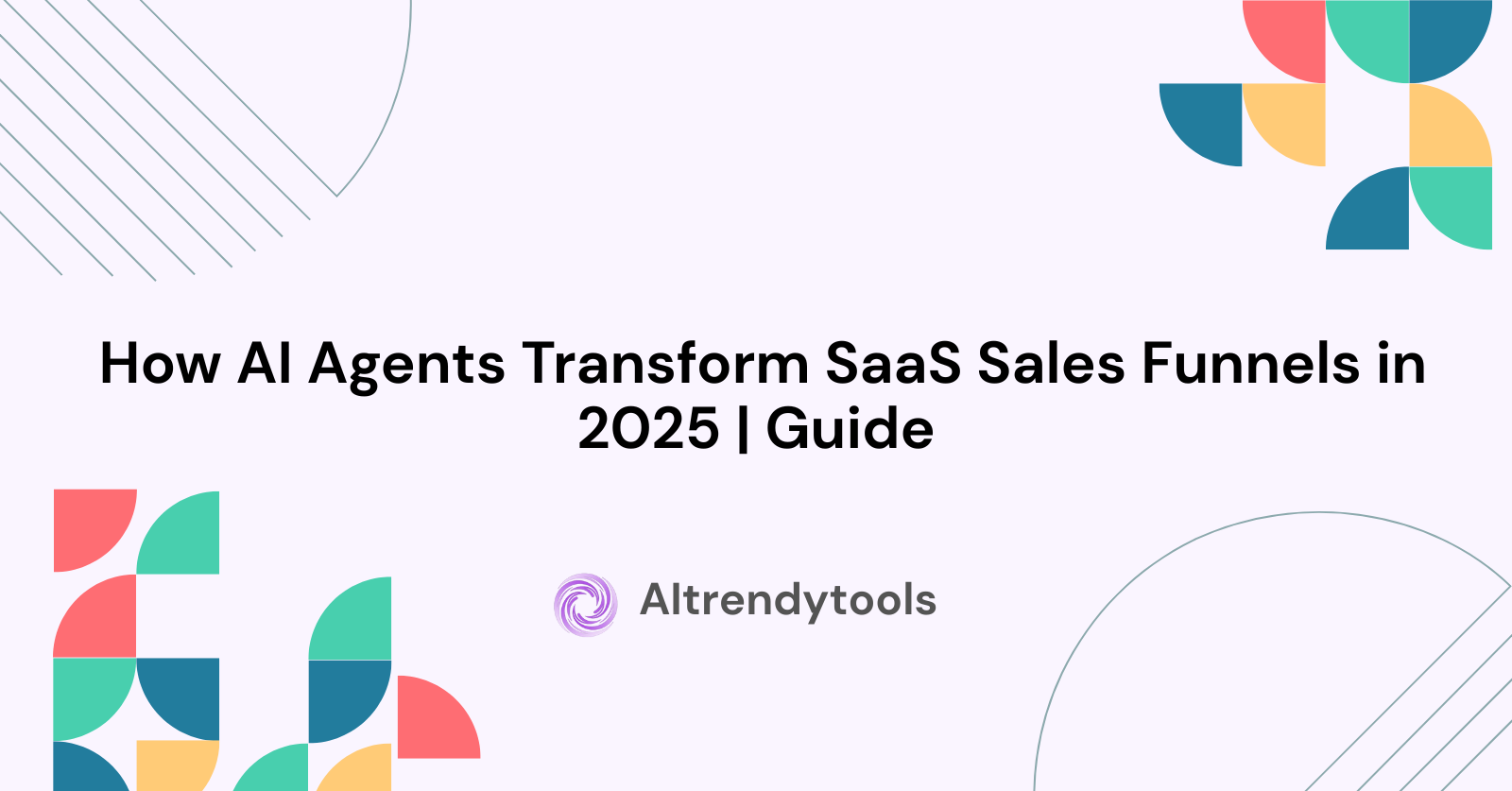🔥 AITrendytools: The Fastest-Growing AI Platform |
Write for usHow AI Agents Transform SaaS Sales Funnels in 2025 | Guide
Discover how AI agents are revolutionizing SaaS sales funnels. Learn automation strategies, lead qualification, and conversion optimization tactics.
Oct 1, 2025
Sales teams waste countless hours on manual lead qualification, repetitive follow-ups, and data entry tasks that drain productivity. AI agents now handle these time-consuming activities automatically, allowing sales professionals to focus on closing deals and building relationships. The transformation happening across SaaS sales funnels represents a fundamental shift in how companies acquire and convert customers.
Traditional sales funnels relied on human intervention at every stage, creating bottlenecks and inconsistent customer experiences. AI agents eliminate these friction points by providing instant responses, personalized interactions, and data-driven insights 24/7. Companies implementing AI-powered sales automation report conversion rate increases of 30-50% while reducing operational costs significantly.
Understanding how AI agents work within modern SaaS sales funnels determines competitive advantage in 2025 and beyond. This comprehensive guide explores the technologies reshaping sales processes, practical implementation strategies, and measurable business outcomes. You'll discover specific ways AI agents enhance each funnel stage from initial awareness through customer retention and expansion.
What Are AI Sales Agents
AI sales agents function as intelligent software systems designed to automate and optimize various sales funnel activities. These systems utilize natural language processing, machine learning, and predictive analytics to interact with prospects autonomously. Unlike simple chatbots following rigid scripts, AI agents learn from interactions and adapt responses based on context and user behavior.
The technology combines multiple AI capabilities including sentiment analysis, intent recognition, and dynamic decision-making. Modern AI sales agents integrate seamlessly with CRM systems, marketing automation platforms, and communication channels. This integration enables comprehensive data collection and analysis that informs sales strategies.
Companies deploy AI agents across various touchpoints including websites, email campaigns, social media, and messaging platforms. The agents handle initial inquiries, schedule meetings, answer product questions, and nurture leads through personalized interactions. Advanced systems even negotiate pricing within predefined parameters and process simple transactions.
Core AI Agent Capabilities:
- Natural language understanding and generation
- Sentiment analysis and emotional intelligence
- Predictive lead scoring and qualification
- Personalized content recommendations
- Automated follow-up sequences
- Multi-channel communication management
- Real-time data analysis and reporting
- Integration with existing sales tools
Traditional SaaS Sales Funnel Challenges
Manual lead qualification consumes approximately 40% of sales representatives' time according to recent industry studies. Sales teams struggle to respond quickly to every inquiry while maintaining personalization at scale. This delay often results in lost opportunities as prospects move to competitors offering faster responses.
Inconsistent follow-up represents another critical challenge in traditional sales funnels. Human sales teams cannot maintain perfect consistency across hundreds of leads simultaneously. Some prospects receive excellent attention while others fall through cracks, creating unpredictable conversion rates.
Data silos prevent sales teams from accessing complete prospect information during critical decision moments. Representatives often lack insights about prospect behavior, previous interactions, or engagement patterns. This information gap leads to generic pitches that fail to address specific prospect needs and pain points.
Traditional Funnel Limitations:
- Slow response times to inbound leads
- Inconsistent lead qualification processes
- Limited personalization at scale
- High operational costs per lead
- Difficulty tracking prospect engagement
- Manual data entry errors
- Limited availability outside business hours
- Inability to analyze patterns across thousands of interactions
How AI Agents Automate Lead Qualification
AI agents analyze multiple data points simultaneously to assess lead quality instantly. The systems evaluate company size, industry, budget indicators, behavioral signals, and engagement patterns. This multi-factor analysis happens in milliseconds, providing immediate qualification scores that route leads appropriately.
Machine learning models trained on historical conversion data identify patterns distinguishing high-value prospects from low-probability leads. The AI recognizes subtle signals like specific questions asked, pages visited, or time spent reviewing pricing information. These behavioral indicators often predict conversion likelihood more accurately than traditional demographic data alone.
Automated qualification reduces human bias and ensures consistent evaluation criteria across all leads. Sales teams receive prioritized lists of prospects most likely to convert, allowing strategic time allocation. Low-quality leads receive automated nurturing sequences rather than consuming sales representative time.
AI Qualification Process:
- Capture initial prospect information and behavior data
- Analyze firmographic and demographic characteristics
- Evaluate engagement signals and behavioral patterns
- Apply machine learning scoring models
- Assign qualification grade and routing priority
- Trigger appropriate nurture or sales hand-off
- Continuously update scores based on new interactions
- Learn from conversion outcomes to improve accuracy
Conversational AI for Sales Engagement
Conversational AI enables natural dialogue between prospects and sales systems across multiple channels. The technology understands context, remembers previous interactions, and maintains conversation continuity. Prospects experience seamless communication whether engaging through website chat, email, SMS, or social media messaging.
Advanced natural language processing allows AI agents to handle complex questions and objections. The systems access knowledge bases instantly to provide accurate product information, pricing details, and feature explanations. When questions exceed AI capabilities, smooth hand-offs to human representatives ensure prospects never hit dead ends.
Personalization algorithms customize conversations based on prospect industry, role, company size, and previous interactions. The AI references specific pain points relevant to each prospect's situation. This contextual relevance significantly increases engagement rates compared to generic automated responses.
Conversational AI Features:
- Multi-turn dialogue with context retention
- Natural language understanding across languages
- Sentiment detection and response adaptation
- Personality customization matching brand voice
- Smooth escalation to human agents
- Omnichannel conversation continuity
- Learning from successful conversations
- A/B testing response effectiveness
AI-Powered Lead Scoring Systems
Lead scoring systems leverage machine learning to predict conversion probability with remarkable accuracy. The algorithms analyze hundreds of variables simultaneously, identifying patterns invisible to human analysis. Scoring models continuously improve as they process more conversion data and outcomes.
Predictive scoring considers explicit data like job title and company revenue alongside implicit behavioral signals. Time on site, content consumed, email engagement, and feature interest all contribute to composite scores. AI systems weight these factors dynamically rather than using fixed point values.
Real-time score updates reflect prospect behavior changes immediately. A prospect downloading a case study or requesting a demo triggers instant score adjustments. Sales teams receive notifications when prospects reach predefined score thresholds, enabling timely outreach at optimal moments.
Scoring Model Inputs:
- Firmographic data (company size, industry, location)
- Demographic information (role, seniority, department)
- Behavioral signals (page views, downloads, engagement)
- Engagement frequency and recency
- Email interaction patterns
- Social media activity
- Technology stack and tools used
- Content consumption topics and depth
Automated Sales Follow-Up Sequences
AI agents execute perfectly timed follow-up sequences that adapt based on prospect responses and behavior. The systems send personalized messages at optimal intervals determined by machine learning analysis. Prospects never feel spammed because AI adjusts frequency based on engagement levels.
Dynamic content insertion personalizes each message with relevant case studies, product information, or resources. The AI selects content matching prospect interests demonstrated through previous interactions. This relevance dramatically improves open rates and response rates compared to generic drip campaigns.
Automated sequences handle objections and common questions without human intervention. When prospects raise concerns about pricing, implementation, or features, AI agents provide targeted responses addressing specific objections. Complex issues trigger human sales representative involvement at precisely the right moment.
Follow-Up Sequence Optimization:
- Send time optimization based on open rate data
- Content personalization using behavioral insights
- A/B testing subject lines and messaging
- Automatic pause when prospect engages
- Re-engagement campaigns for inactive leads
- Multi-channel sequence coordination
- Response detection and routing
- Continuous learning from campaign performance
AI Sales Assistant Integration
Modern AI sales assistants integrate with existing CRM systems to enhance rather than replace current processes. The integration provides sales representatives with real-time insights, suggested actions, and automated administrative tasks. Representatives maintain control while benefiting from AI-powered efficiency and intelligence.
Meeting scheduling automation eliminates back-and-forth email exchanges consuming hours weekly. AI assistants access calendar availability, propose times, send invitations, and handle rescheduling requests. This simple automation saves each sales representative 5-10 hours monthly.
Email composition assistance helps representatives craft compelling messages faster. AI suggests subject lines, email copy, and follow-up timing based on successful patterns. Representatives edit and approve suggestions, maintaining personal touch while leveraging data-driven recommendations.
Sales Assistant Functions:
- Automated meeting scheduling and coordination
- Email drafting and response suggestions
- Next-best-action recommendations
- Data entry automation from calls and emails
- Opportunity risk assessment alerts
- Competitor intelligence gathering
- Contract and proposal generation
- Performance analytics and coaching insights
Chatbot Sales Funnel Optimization
Website chatbots serve as always-available first responders capturing visitor information and intent. The bots qualify visitors through conversational interfaces that feel helpful rather than interrogative. Qualified prospects receive immediate attention while others enter appropriate nurture tracks.
Strategic placement throughout the customer journey maximizes chatbot effectiveness. Different bot personalities and messaging work better at various funnel stages. Awareness-stage bots focus on education and information gathering while consideration-stage bots emphasize product fit and value demonstration.
Platforms like AiTrendyTools showcase how modern chatbot implementations combine multiple AI capabilities for optimal results. Analytics dashboards reveal conversation patterns, drop-off points, and conversion paths. These insights drive continuous optimization that improves conversion rates over time.
Chatbot Optimization Strategies:
- Welcome message testing and personalization
- Question flow optimization based on completion rates
- Response time benchmarking and improvement
- Hand-off timing to human agents
- Qualifying question sequence refinement
- Integration with lead scoring systems
- Conversation analytics and pattern recognition
- Mobile experience optimization
Machine Learning Sales Optimization
Machine learning algorithms identify patterns and opportunities invisible through manual analysis. The systems process vast datasets including won/lost deals, communication logs, prospect behavior, and market conditions. Insights generated inform strategy adjustments that compound effectiveness over time.
Win probability prediction helps sales teams prioritize opportunities most likely to close. The algorithms consider deal characteristics, prospect engagement, competitive situations, and historical patterns. Representatives focus energy on high-probability opportunities while automated systems nurture others.
Pricing optimization algorithms suggest optimal price points based on prospect characteristics and willingness to pay signals. The systems identify when discounting increases conversion probability versus when full pricing maintains higher margins. This dynamic pricing approach maximizes revenue while maintaining competitive win rates.
Machine Learning Applications:
- Churn prediction and prevention
- Upsell and cross-sell opportunity identification
- Optimal contact timing recommendations
- Sales cycle length prediction
- Resource allocation optimization
- Territory and account assignment
- Marketing channel attribution
- Competitive win/loss analysis
AI Agent Implementation Strategy
Successful AI agent deployment begins with clearly defined objectives and success metrics. Companies must identify specific funnel bottlenecks or inefficiencies that AI agents will address. Starting with focused use cases demonstrates value quickly while building organizational confidence.
Data preparation represents a critical but often underestimated implementation phase. AI agents require quality historical data about prospects, conversations, and conversion outcomes. Cleaning and organizing this data before deployment dramatically improves initial AI performance and shortens learning curves.
Gradual rollout allows teams to learn, adjust, and optimize before full-scale deployment. Pilot programs in specific regions, products, or customer segments provide valuable insights. Teams identify integration challenges, training needs, and process adjustments before company-wide implementation.
Implementation Roadmap:
- Audit current sales funnel and identify pain points
- Define specific AI agent objectives and KPIs
- Assess data quality and prepare datasets
- Select AI platforms and tools matching needs
- Design conversation flows and decision trees
- Integrate with existing CRM and marketing tools
- Train AI models on historical data
- Launch pilot program with defined scope
- Gather feedback and measure performance
- Optimize based on learnings and expand deployment
Measuring AI Agent ROI
Tracking key performance indicators demonstrates AI agent value and identifies optimization opportunities. Lead response time improvements represent the most immediate measurable impact. Companies typically see response times drop from hours or days to seconds after AI agent deployment.
Conversion rate changes across funnel stages reveal AI agent effectiveness at each touchpoint. Measuring conversion from visitor to qualified lead, qualified lead to opportunity, and opportunity to customer isolates specific impact areas. Many organizations report 25-40% conversion rate improvements within six months.
Cost per acquisition calculations compare AI-powered funnel economics against traditional approaches. While initial implementation requires investment, ongoing operational costs decrease significantly. Most companies achieve positive ROI within 6-12 months as automation scales without proportional cost increases.
AI Sales Tools Comparison
Multiple platforms offer AI agent capabilities with varying features, pricing, and implementation complexity. Drift and Intercom lead the conversational AI chatbot space with robust integrations and proven track records. These platforms work well for companies prioritizing website conversion and initial engagement automation.
Salesforce Einstein and HubSpot Sales Hub provide comprehensive AI assistants integrated with full CRM functionality. The integrated approach simplifies data management and provides unified analytics. Companies already using these CRM platforms often find native AI capabilities the most practical starting point.
Specialized AI sales platforms like Gong and Chorus focus on conversation intelligence and coaching. These tools analyze sales calls and meetings to identify successful patterns and improvement opportunities. The insights complement other AI agents by improving human sales interactions.
Platform Selection Factors:
- Integration with existing tech stack
- Ease of implementation and training requirements
- Scalability to support growth
- Customization flexibility
- Pricing model and total cost of ownership
- Vendor support and community resources
- Security and compliance features
- Proven results in similar industries
Personalization at Scale Through AI
AI agents deliver individualized experiences to thousands of prospects simultaneously. The systems analyze each prospect's unique characteristics, behavior patterns, and engagement history. Content recommendations, messaging tone, and information hierarchy adapt dynamically to match individual preferences.
Dynamic website personalization changes page content, calls-to-action, and feature emphasis based on visitor profiles. Returning visitors see content reflecting their previous interests and stage in the buying journey. This contextual relevance significantly increases conversion rates compared to static generic pages.
Email personalization extends beyond basic name insertion to comprehensive message customization. AI agents select relevant case studies, highlight appropriate features, and address likely objections based on recipient characteristics. This sophisticated personalization drives email response rates 2-3 times higher than generic campaigns.
Personalization Elements:
- Industry-specific messaging and examples
- Role-based content and value propositions
- Company size-appropriate solutions
- Technology stack integration examples
- Geographic and cultural adaptations
- Buying stage-specific information
- Pain point-focused problem solving
- Competitive situation awareness
AI Agent Best Practices
Human oversight remains essential despite automation capabilities. Sales teams should regularly review AI agent conversations to identify improvement opportunities and ensure brand alignment. Establishing clear escalation protocols prevents AI agents from handling situations beyond their capabilities.
Transparency about AI involvement builds trust with prospects. Clearly indicating when prospects interact with AI agents versus human representatives sets appropriate expectations. Many successful implementations use hybrid approaches where AI handles initial qualification before human representatives take over.
Continuous training and optimization keep AI agents performing effectively as markets and products evolve. Regular updates to knowledge bases, conversation flows, and scoring models maintain relevance. Companies treating AI agents as ongoing optimization projects rather than one-time implementations achieve best results.
Implementation Best Practices:
- Start with clearly defined use cases
- Maintain human oversight and review processes
- Be transparent about AI involvement
- Establish clear escalation criteria
- Update knowledge bases regularly
- Monitor conversation quality metrics
- Gather prospect feedback systematically
- Test and optimize continuously
- Train sales teams on AI collaboration
- Celebrate wins and share success stories
Future of AI in SaaS Sales
Predictive analytics will advance beyond lead scoring to forecast entire account relationship trajectories. AI systems will recommend optimal growth paths including upsell timing, feature adoption sequences, and expansion opportunities. This proactive approach transforms sales from reactive lead pursuit to strategic relationship orchestration.
Voice-based AI agents will handle increasingly complex sales conversations through phone and video channels. Natural speech synthesis and understanding will make phone-based AI agents indistinguishable from human representatives for routine interactions. Complex negotiations will still require human expertise, but AI will handle 70-80% of initial conversations.
Autonomous AI agents will manage complete sales cycles for lower-value transactions without human involvement. These systems will identify prospects, conduct needs analysis, present solutions, handle objections, negotiate terms, and close deals. Human sales professionals will focus exclusively on high-value strategic accounts requiring relationship building and consultative selling.
Emerging AI Capabilities:
- Video-based conversational AI agents
- Emotion recognition and response adaptation
- Autonomous negotiation within parameters
- Predictive opportunity identification
- Real-time competitor intelligence
- Automatic proposal and contract generation
- Advanced voice synthesis and understanding
- Cross-channel conversation orchestration
Overcoming AI Implementation Challenges
Data quality issues represent the most common implementation obstacle. Many organizations discover their CRM data contains duplicates, incomplete records, and inconsistencies that confuse AI systems. Dedicating resources to data cleaning before AI deployment prevents frustrating false starts.
Sales team resistance stems from concerns about job security and technology complexity. Successful implementations emphasize how AI augments rather than replaces human representatives. Training programs demonstrating productivity gains and easier workflows build adoption enthusiasm.
Integration complexity with legacy systems creates technical challenges for many organizations. Working with experienced implementation partners or platforms like AiTrendyTools that specialize in system integration reduces technical risks. Phased approaches that connect systems incrementally often succeed where big-bang implementations fail.
Common Challenges and Solutions:
- Challenge: Poor data quality → Solution: Conduct data audit and cleaning project
- Challenge: Team resistance → Solution: Focus on productivity benefits and training
- Challenge: Integration difficulties → Solution: Use experienced partners and phased approach
- Challenge: Unclear objectives → Solution: Define specific metrics before starting
- Challenge: Insufficient training data → Solution: Start with simpler use cases
- Challenge: Brand voice misalignment → Solution: Customize AI personality and review regularly
AI Agent Security and Compliance
Data privacy regulations require careful attention when implementing AI sales agents. GDPR, CCPA, and other privacy laws govern how prospect information gets collected, stored, and used. AI systems must include consent mechanisms, data retention policies, and deletion capabilities.
Security measures protect sensitive prospect and company information from unauthorized access. Encryption, access controls, and audit logging represent standard security requirements. AI platforms should maintain SOC 2, ISO 27001, or equivalent security certifications.
Bias detection and mitigation ensure AI agents treat all prospects fairly regardless of demographic characteristics. Regular audits of AI decision-making patterns identify potential discriminatory outcomes. Diverse training data and explicit fairness constraints reduce bias risks.
Compliance Considerations:
- Data privacy law adherence (GDPR, CCPA)
- Consent collection and management
- Data retention and deletion policies
- Security certifications and audits
- Bias detection and mitigation
- Transparent AI disclosure requirements
- Industry-specific regulations (financial services, healthcare)
- Cross-border data transfer compliance
FAQ: AI Agents in SaaS Sales
How much does implementing AI sales agents cost?
Implementation costs vary widely based on company size, platform choice, and customization requirements. Small businesses can start with basic chatbot platforms for $50-200 monthly. Enterprise solutions with custom integrations typically cost $2,000-10,000 monthly plus implementation fees ranging from $10,000-100,000 depending on complexity.
Will AI agents replace human sales representatives?
AI agents augment rather than replace human sales professionals in most scenarios. The technology handles repetitive tasks, initial qualification, and routine inquiries. Human representatives focus on complex deals, relationship building, and strategic selling where emotional intelligence and creativity create value.
How long does AI agent implementation take?
Basic chatbot implementations can go live in 2-4 weeks. Comprehensive AI sales assistant deployments typically require 3-6 months including data preparation, integration, training, and pilot testing. Ongoing optimization continues indefinitely as systems learn and improve.
What data do AI agents need to function effectively?
AI agents require historical data about prospects, conversations, and conversion outcomes. Minimum datasets include 6-12 months of CRM records, communication logs, and deal information. More data improves AI performance, but basic functionality works with limited datasets.
Can AI agents work with our existing CRM system?
Most modern AI platforms integrate with major CRM systems including Salesforce, HubSpot, Pipedrive, and Microsoft Dynamics. Custom CRMs may require additional integration development. Evaluating integration capabilities should be a primary consideration when selecting AI platforms.
How do we measure AI agent success?
Success metrics depend on implementation objectives but typically include lead response time, qualification rates, conversion rates at each funnel stage, sales representative productivity, and cost per acquisition. Establishing baseline measurements before implementation enables accurate impact assessment.
What happens when AI agents can't answer questions?
Well-designed AI systems recognize when questions exceed their capabilities and escalate to human representatives smoothly. The escalation includes full conversation context so prospects don't repeat information. Setting appropriate escalation thresholds prevents AI from providing inaccurate information.
Do prospects prefer AI agents or human sales representatives?
Research shows prospects value speed and convenience over human interaction for routine questions and information gathering. Complex buying decisions still benefit from human relationships. Most prospects appreciate AI for initial engagement with human involvement during critical decision moments.
Conclusion
AI agents fundamentally transform SaaS sales funnels by automating repetitive tasks, personalizing interactions at scale, and providing data-driven insights. Companies implementing AI-powered sales automation achieve measurable improvements in conversion rates, cost efficiency, and sales team productivity. The technology shifts human representatives from administrative tasks toward high-value strategic selling.
Successful implementation requires clear objectives, quality data, thoughtful integration, and continuous optimization. Organizations approaching AI agents as augmentation tools rather than replacement technologies see strongest adoption and results. The human-AI collaboration model delivers superior outcomes compared to either approach alone.
The competitive landscape increasingly favors companies leveraging AI capabilities throughout their sales funnels. Organizations delaying AI adoption risk falling behind competitors who provide faster responses, better personalization, and more efficient processes. Starting with focused use cases and expanding based on results creates sustainable competitive advantages in evolving markets.
🚀 Submit Your Tool to Our Comprehensive AI Tools Directory
Get your AI tool featured on our complete directory at AITrendytools and reach thousands of potential users. Select the plan that best fits your needs.





Join 30,000+ Co-Founders
Related Blogs
ClassPoint Review: Best Interactive Teaching Tool
ClassPoint transforms PowerPoint into an interactive classroom. Compare features, pricing & alternatives in this complete teacher's guide
Maharashtra Times: Maharashtra's #1 Marathi Newspaper
Maharashtra Times (मटा) is Maharashtra's #1 Marathi newspaper since 1962. Read today's ePaper, download the free app & get live news from Mumbai, Pune & beyond.
MovieSwap: The Bold Idea to Free Every Movie Ever Made
MovieSwap wanted to let you stream any movie ever made legally. Discover why this bold Kickstarter idea failed and what it means for film fans today.
Submit Your Tool to Our Comprehensive AI Tools Directory
List your AI tool on AItrendytools and reach a growing audience of AI users and founders. Boost visibility and showcase your innovation in a curated directory of 30,000+ AI apps.





Join 30,000+ Co-Founders

